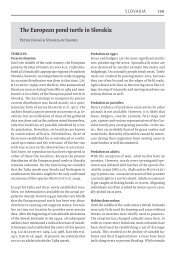Dear Attendees of the EMYS Symposium at Košice - Fauna Carpatica
Dear Attendees of the EMYS Symposium at Košice - Fauna Carpatica
Dear Attendees of the EMYS Symposium at Košice - Fauna Carpatica
Create successful ePaper yourself
Turn your PDF publications into a flip-book with our unique Google optimized e-Paper software.
ECOLOGY AND POPULATION DYNAMICS<br />
A majority <strong>of</strong> living organisms is parasitic and parasite-host rel<strong>at</strong>ionships thus<br />
represent one <strong>of</strong> <strong>the</strong> driving forces <strong>of</strong> evolution. Additionally, infectious organisms<br />
may represent serious thre<strong>at</strong> for small, disturbed host popul<strong>at</strong>ions. Unfortun<strong>at</strong>ely,<br />
our knowledge on parasites <strong>of</strong> most wild vertebr<strong>at</strong>es is still in its infancy and more<br />
intensive cooper<strong>at</strong>ion between researchers interested in host biology and<br />
conserv<strong>at</strong>ion and those studying parasites is needed. Emys orbicularis is parasitised<br />
by numerous micro and macroparasites, and every group <strong>of</strong> parasites needs its own<br />
research technique. Among parasitic symbionts reported for E. orbicularis, <strong>the</strong> most<br />
numerous are helminths. Unfortun<strong>at</strong>ely, helminthological studies are only possible<br />
on living hosts and parasitological dissection is still a key method for <strong>the</strong> collection<br />
<strong>of</strong> most <strong>of</strong> <strong>the</strong>se macroparasites. Logically, such an invasive technique is hardly<br />
possible in small popul<strong>at</strong>ions suffering from anthropogenous pressure. On <strong>the</strong> o<strong>the</strong>r<br />
hand, detailed helminthological examin<strong>at</strong>ion is always recommendable in dead or<br />
euthanised specimens. A basic review <strong>of</strong> common helminths <strong>of</strong> E. orbicularis is<br />
presented. In contrast, some protozoan species are much more easily collected from<br />
faeces or blood samples <strong>of</strong> living specimens. Haemogregarina stepanowi and<br />
Eimeria delagei are apicomplexan parasites <strong>of</strong> E. orbicularis, which represent ideal<br />
targets for future studies. H. stepanowi is a blood apicomplexan parasite transmitted<br />
by leeches, and its stages can be easily detected in stained blood smears. E. delagei<br />
is an intestinal coccidium with direct life cycle, its oocysts being detectable in<br />
faeces <strong>of</strong> studied tortoises. The life cycles, examin<strong>at</strong>ion methods, potential impact<br />
on host animals and proposals for future research are discussed.<br />
ORAL PRESENTATION - 20 April, 11:40 - 12:00<br />
Has fishing an effect on <strong>the</strong> survival <strong>of</strong> Emys orbicularis<br />
M. NEMOZ 1,4 , ANTOINE CADI 2,3 and STÉPHANIE THIENPONT 1<br />
1 Associ<strong>at</strong>ion Lo Parvi, 38890 Saint Chef, France<br />
2 UMR CNRS Ecologie des Hydrosystèmes fluviaux, Université Claude Bernard Lyon1,<br />
69622 Villeurbanne Cedex, France<br />
3 Conserv<strong>at</strong>oire Rhône-Alpes des Espaces N<strong>at</strong>urels, 2 rue des Vallières, 69390 Vourles,<br />
France<br />
4 Corresponding author for abstract [E-mail: LO.PARVI@wanadoo.fr]<br />
Two wild popul<strong>at</strong>ions <strong>of</strong> Emys orbicularis have been studied in Nord Isère (France)<br />
over two years. The first popul<strong>at</strong>ion inhabits a pond system where fishing is<br />
permitted (AREA 1), while <strong>the</strong> second one occupies a protected area where fishing<br />
is forbidden (AREA 2). Two methods were used for d<strong>at</strong>a acquisition: capturerecapture<br />
through trapping and radiotracking (20 radiotracked individuals in each<br />
36



